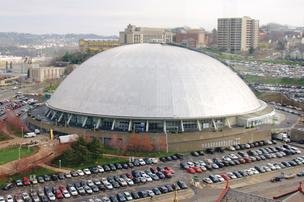
- Paul J. Gough and Tim Schooley
- Pittsburgh Business Times
The Hill District will get more investment and the Pittsburgh Penguins more time in a series of agreements announced Tuesday that will lead the way for the development of 28 acres at the former Civic Arena site.
The agreement between the Pittsburgh Penguins, Pittsburgh Mayor Bill Peduto's administration and Hill District Councilman Daniele Lavelle includes 20 percent affordable housing. A larger collaboration that includes the Urban Redevelopment Authority of Pittsburgh, the Sports & Exhibition Authority, the city, the county and Pittsburgh Public Schools will create a new tax-increment financing district worth between $22 million and $50 million for the entire Hill District, which Peduto said would be the largest TIF district by territory in the city's history.
Portions of the tax revenue from the development of the 28 acres are expected to be used for development throughout the Hill TIF district, although details will need to be determined by an advisory committee, and the TIF will need to be fully approved by the city, county and school district
Peduto also announced a one-year extension on the initial development plan the Pittsburgh Penguins established with the SEA, in which the team was required to buy 10 percent of the 28 acres by the end of the year. The Penguins now have until next October to do so.
Peduto and City Council Member R. Daniel Lavelle both discussed the historic nature of the development, which they said would reconnect the Hill District to downtown, a tie that was lost when the Civic Arena was built in the 1960s.
"Fifty years ago, the Hill was severed. The center of our economic vitality was removed," Lavelle said at the news conference. "... We've never recovered from that. The ability to reconnect the Hill District to the No. 2 job center in the state of Pennsylvania is critical."
The Penguins' plans include mixed-used development of 1,100 residential units, between 500,000 and 600,000 square feet of office space, and retail space. That includes 20 percent affordable housing as low as $600 a month, according to information presented at the news conference. The lead residential developer is McCormick Baron Salazar, and the Penguins have agreed to bring in a minority developer to build at least 250 residences, said Penguins COO Travis Williams.
Williams said enough infrastructure funding is in place for the Pittsburgh Penguins to move forward on the initial phase of the development. But he added more funding is still needed for the overall project.
"You'll start to see work on the site we believe within the next six to nine months," he said.
The SEA is still waiting on whether the 28-acre arena site will receive a $20-plus million TIGER grant, a competitive program for which the arena site was turned down last year.
Peduto said he expects to hear word of the decision this month.
Also announced Tuesday was the awarding of a $1.55 million grant from the U.S. Department of Transportation. U.S. Sen. Bob Casey, D-Penn., said in a statement the grant will go to design a connection between the Hill District and downtown Pittsburgh.
The announcement was made by Peduto, Lavelle, Allegheny County Executive Rich Fitzgerald and others at an 11 a.m. news conference.
"It took a lot to get here, and there was a lot of give and take," Lavelle said.
Paul J. Gough is digital producer at the Pittsburgh Business Times. Contact him at pgough [at] bizjournals.com or 412-208-3827. You can also follow him on Twitter.
Tim Schooley covers retail, real estate, construction, hospitality, arts and entertainment, and government. Contact him at tschooley [at] bizjournals.com or 412-208-3826.